This blog was written by Laura Humphrey, former Energy Policy Associate at the Southern Alliance for Clean Energy.
Guest Blog | January 11, 2019 | Energy Efficiency, Energy Justice, Events, TennesseeTemperatures are falling in East Tennessee, but what Knoxville Utility Board (KUB) customers would really like to “chill” are their monthly electric bills. As the temps have dropped, bills have gone up, but it’s not just the cold weather that’s to blame. A big culprit is what is called the “basic customer charge” on KUB bills. The “basic customer charge” is just another name for a monthly, mandatory, fixed fee, a portion of the electric bill that customers are charged before they even flip on a light switch. KUB’s monthly mandatory fee has increased 300% since 2010, a rate-setting record for a municipal utility in the Tennessee Valley Authority service territory. Join Southern Alliance for clean energy by signing the petition telling KUB to chill – and Freeze the Fees!

Higher fixed fees inevitably result in higher bills– all year round! Let’s take a closer look at the three parts that make up a KUB electric bill:
- The base rate is what you pay per unit of energy you use, this is measured in kilowatt hours (kWh). This base rate increased 1.5% in October and is included in your kilowatt hour charge.
- The usage or consumption is how many kilowatt hours of energy a customer uses, you can control this with your lights and thermostat.
- The fixed fee, which KUB increased $1.50 in October and now totals $19 per month up from $6 in 2010
The combination of the 1.5% base rate increase set by TVA in October and KUB’s fixed fee increase mean that customers are getting a double whammy on their electric bills just in time for cold winter months, creating a burden for Knoxville residents & small businesses this winter.
Why has KUB dramatically increased fixed fees?
The first answer is because they can, and because no one is speaking out. KUB is betting that as long as they quietly raise these fees only a dollar or so a year, NOBODY will pay attention. TVA also has a hand in this scheme. TVA, as KUB’s power provider, instituted its own wholesale fixed fee called the Grid Access Charge on distributors like KUB this year. Using a fixed fee, TVA collects money from customers without having to sell as much electricity. Similar increases are happening across the TVA service territory. Since 2010, in the TVA region, mandatory fixed fees are up 50%, but KUB’s basic customer charge has one of the biggest increases of a municipal utility served by TVA. KUB also likes to state the fee increases are due to maintenance, but to keep things fair, upgrades should be covered by adjusting the kilowatt hour rate rather than the fixed fee.
Why are fixed fees considered a “blunt instrument” and lazy method when setting electrical rates?
Fixed fees are the heaviest-handed method to collect revenues. With higher fixed fees, customer lose the ability to control their bills because they pay the fee no matter how much power they consume. In the past, KUB has used this method to move quickly to get the job done. A high fixed fee essentially cuts the communication between a utility and its customers. Normally, customers receive market signals from the utility in the form of the kilowatt hour charge. Often utilities argue that increasing the fixed fee helps “level-out” bills during cold months like January, but in reality, unless they are very high users, customers end up paying more throughout the year.
Do fixed fees really hurt anyone?
Paying more throughout the year can be especially burdensome on low-usage groups such as those on a fixed income, the elderly, low-income, single-resident households, small businesses, and those investing in energy efficiency and renewable energy. These groups are the most likely to be conscious of their energy use since many of these groups pay a greater proportion of their household incomes toward their energy bills. In the case of low-income customers, their proportion of income paid towards household energy can be 10 times the amount of someone who is not low-income while still using 5 times less energy. In Knoxville, KUB customers can pay up to 18.5% of their income on their energy bills.

Utilities additionally argue that lower-income customers’ high bills are because of poor housing stock, which should be addressed through targeted energy efficiency programs. However, higher fixed fees would reduce the gains made by these recommended energy efficiency programs such as Round-it-Up, the Knoxville Energy Home Makeover (KEEM), or the Home Energy Uplift Programs, because they remove the opportunity for monthly savings! Households that are working to keep their energy bills low by reducing their usage lose their ability to control their bills with higher fixed fees. Additionally, a high fixed fee is a disincentive for proactive customers that want to self-generate their own electricity with renewables such as solar panels and adds yet another challenge to the margins of both new and existing small businesses, the backbone of Knoxville’s economy. Knoxville is also facing a housing affordability crisis, and energy bills are a key part of housing affordability. KUB’s high fixed fees only worsen these issues and create a stumbling block toward home ownership.
With so many groups affected by rising fixed fees, what can be done?
Since January of last year, Southern Alliance for Clean Energy has been attending KUB Board Meetings every month to speak against future fixed fee increases. Many from Knoxville and surrounding counties have joined us, sharing their stories with the KUB Board about how high fixed fees have affected their households. The KUB Board needs to hear stories from the community to understand how impactful KUB’s decision to further increase fixed fees can be on households and businesses.
Interested in coming to a KUB meeting? Contact me at [email protected]
KUB has also received letters & phone calls from customers, and SACE has expressed these concerns to KUB’s new CEO, Gabe Bolas. SACE wants to ensure that everyone’s voice is heard by the KUB Board, even if you cannot attend a board meeting. That’s why SACE is launching the Freeze the Fees petition. Once we’ve collected 750 signatures, we plan to deliver these to the board meeting to show KUB how many customers are opposed to increased fixed fees.
We can reach 750 signatures to tell the KUB Board that the community of Knoxville will not stand by as KUB continues to harm our most vulnerable residents or slows Knoxville advancing towards a clean energy future by continuing to increase fixed fees, but we need your help!
Sign the Freeze the Fees petition today!